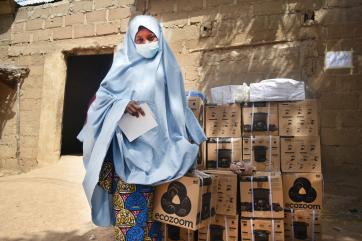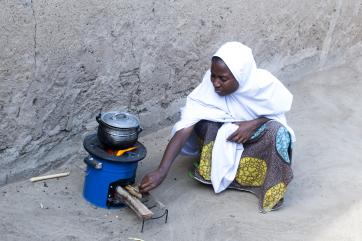REACH-4: Providing food security for the most vulnerable in Damboa, Borno state
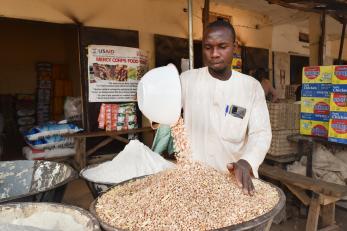
Meeting urgent humanitarian needs
Many communities in northeastern Nigeria continue to face various levels of humanitarian crisis because of the conflict, with about 2 million displaced and 1 million returnees in need of urgent humanitarian assistance (IOM, 2021). With the increasing levels of insecurity, many families have had to flee their homes, oftentimes leaving the most vulnerable behind, consisting of the elderly, women, and children, and their major source of livelihood.
These conflict affected households in hard-to-reach areas mainly have little to no food stocks and access food through wild foods. They also face limited market access, no purchasing power and emergency. Damboa, in Borno state, is one of the most affected, cut off from major roads and food supplies, with families having to heavily depend on humanitarian assistance.
To support the most vulnerable households in Damboa, Mercy Corps through funding from the United States Agency for International Development Office for Food for Peace (USAID FFP) implemented the Responsive Economic Assistance to Conflict-Affected Households (REACH-4) program.
About REACH-4
REACH-4 aimed to build the resilience of 13,512 vulnerable households consisting of over 94,000 individuals living in Damboa, Borno state, by investing in their food security and nutrition. The program began in 2016 and was in its fourth iteration, which ended in March 2021. Mercy Corps built upon the previous iterations of REACH’s food security responses in Northeast Nigeria by working with local markets and vendors to increase access to both staple and nutrient-dense food for conflict-affected households, while also shaping behaviors to support optimal nutrition and increase the availability of nutrient-dense foods.
Working closely with women, community leaders and government officials, our participants were connected to a variety of interventions including the provision of monthly food baskets, promotion of good nutrition practices, nutrition surveillance, supporting long-term food security and safe access to fuel and energy.
In light of the program success, Mercy Corps held a dissemination event with key stakeholders and the media to share the program impact, lessons learned and adaptations in the times of COVID‑19. Part of the adaptations and lessons learned are what is being fed into a new humanitarian program, Addressing Diverse and Acute Primary Threats (ADAPT) to Human Security in North Eastern Nigeria, which would be providing an array of interventions on food-security, nutrition, shelter, wash, multipurpose cash assistance, protection, and humanitarian analysis across various local government areas in Borno state.
Key impacts under the program are captured below, with feedback from our participants documented in this report.
Our impact
- 94,052 individuals (13,436 households) received food vouchers to purchase dry and fresh food from locally selected vendors
- 116,556 individuals reached with nutrition services consisting of Mid-Upper Arm Circumference (MUAC) infant screening and sensitization for key population groups
- Provided 240 households with access to a nutritious source of protein in the form of chicken and eggs, thereby improving their nutritional status and increasing households’ livelihood activity
- Provided 945 households with tools and skill-building training for kitchen gardening to grow locally staple vegetables and seeds they can incorporate into their meals
- 5,099 fuel-efficient stoves distributed to vulnerable households. To ensure that they can prepare staple and fresh foods safely and hygienically on a regular basis
Voices from the field
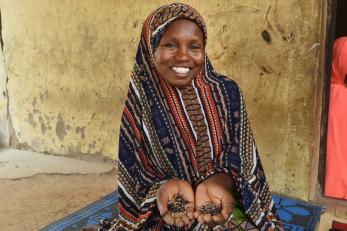
Amina Adam, mother of five lives in Damboa with her husband and extended family. Her family used to depend on farming to fend themselves and provide food for the family, but since the start of the insurgency, she has been unable to access her farm and get the needed food supply.
“Life is tough here, we are constantly living in fear, I cannot access my farm. The food we collect from Mercy Corps has been our major source of food. It is with the seeds that Mercy Corps gave me to start the kitchen gardening that I was able to plant some crops and sell them to buy uniforms for my children. Sometimes I take 10-20 naira out of the money to buy something to eat,” Amina shares on life in Damboa.
Amina was one of the participants who received the kitchen gardening training, where she learned how to plant amaranths, carrot, onions, cabbage and lettuce and how to carry out pest control. Her interest for kitchen gardening came from seeing her husband work as an irrigation farmer, while supporting him on their household farm. Amina found the amaranth's seeds to be the most nutritious from her farm, adding it to everything she cooks, from jollof rice to soups. She expressed her excitement with how profitable she has found the kitchen gardening to be, especially from the sale of lettuce and cabbage, which she says can fetch her about 700 naira from a sale.
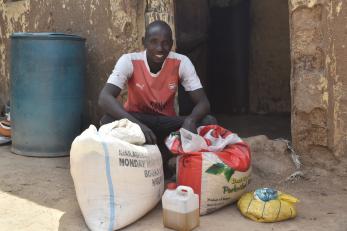
Muhammed Usman supports his family of five, his parents and brother’s family. Muhammed like several other breadwinners in Damboa are unable to maintain a sustainable livelihood due to increasing security concerns which has forced many households to remain reliant on humanitarian assistance. He has had to depend on Mercy Corps monthly food supply and occasional menial labor as a construction worker and irrigation support farmer to provide for his family.
“Working as a laborer is a work that should be done by a younger person. As I grow older, I wish to start a profitable business that I can use to support my family. Even with the monthly food supply, we sometimes still face food shortages,” said Muhammed. He hopes to start a neighborhood farm with the training on kitchen gardening and irrigation he received from Mercy Corps.
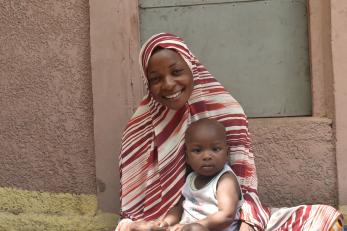
36-year-old mother of six, Fati Inuwa was affected during an insurgency attack, which displaced her and many members of her family. Fleeing into different directions, she found herself alone in an Internally Displaced Persons (IDP) camp in Biu, Borno state. It was not until after a couple of months, that she was able to reconnect with her husband and children, before they could return home to Damboa when it was declared relatively safe. Fati confirmed that some families had chosen to return to Damboa, despite the security issues because it was their ancestral home. However, she and her husband are unable to work and do not have the means to purchase food for themselves, a major reason they rely on Mercy Corps’ food assistance.
“We used to be constantly worried about hunger. I cannot tell you how important this food assistance is. I used to borrow money from neighbors and do odd jobs to survive. Now, we can eat food we would not have been able to buy with our own money. I could not even buy two eggs, but we are able to get about one to two crates from Mercy Corps,” said Fati concerning the monthly food rations her family received.
She is a member of the mother to mother support group in her ward, where she received nutrition lessons on exclusive breastfeeding and how to prepare nutritious supplementary meals from cooking demonstrations. Fati’s 9-month old baby, Abdul shows great improvement from being a beneficiary of these lessons, as he looks very healthy and active.
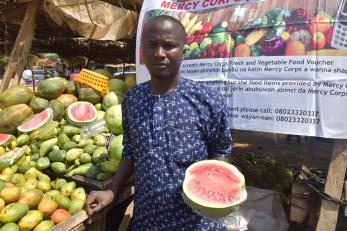
Bulama used to support his family doing menial jobs fixing returnee families’ homes before being a food assistance recipient and then a vendor with Mercy Corps. Bulama saw the opportunity to become a fresh fruits and vegetable food vendor when he saw a call for application for vendors and realizing that requests for his menial job rebuilding homes were dwindling. With some money he had saved, not spending on food while receiving food assistance, and running his fresh fruits store, Bulama registered his business as a food vendor. With the profits made from his fresh food business, Bulama has been able to build a house for his parents and renovate his house.
“I have a family and people who depend on me, without this business I would not have been able to provide for them. Even with the end of the program, I will still be able to continue this business. I see hunger for my people as they are unable to venture out of Damboa to find firewood, I hope that Mercy Corps will continue with this life-saving assistance,” said Bulama.
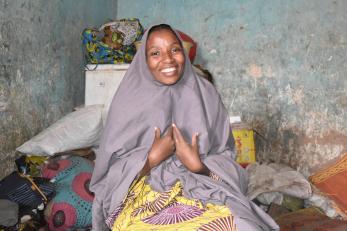
30-year old Halima Mustapha is a mother of six and a lead nutrition mother in Damboa. She was affected by the conflict when their house was burned and four of her family members were killed. They fled Damboa but had to return to restart their lives. Her family used to suffer from food shortage, with barely enough to eat while they slept on mats in their old home. Her husband does not work, as he is unable to go to his farm. However, they were able to cope with these challenges when they started receiving food and cash assistance from Mercy Corps, in addition to Halima’s business as a tailor.
“It was difficult to feed before Mercy Corps food and cash assistance, we sometimes begged for food. COVID‑19 prevented our men from going to the market. We barely had clothes to wear but with the money we received, I am able to sew clothes for us all. We hope that we will continue to access food because we are still unable to go to the farm,” said Halima.
Halima became a lead nutrition mother with the support she received from Mercy Corps, educating other mothers in her ward on good nutrition practices and how to prepare nutritious meals. She was also one of the recipients of poultry support and fuel efficient stoves that was distributed to support families to prepare hygienic meals without having to face the fear of insurgent attacks from seeking firewood from the bush.
